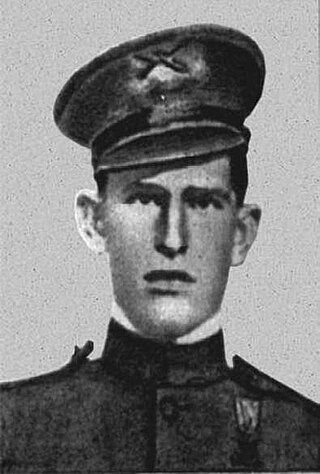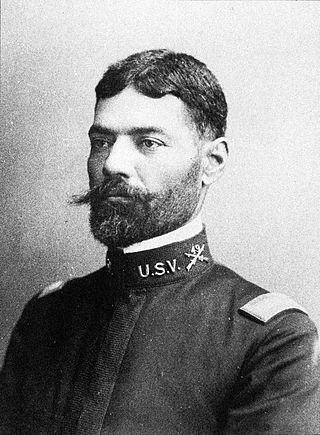Patrick James Leonard | |
|---|---|
| Born | May 19, 1847 County Meath, Ireland |
| Died | January 24, 1899 (aged 51) |
| Allegiance | United States of America |
| Service/ | United States Army |
| Rank | Sergeant |
| Unit | Company C, 2d U.S. Cavalry |
| Battles/wars | Indian Wars |
| Awards | Medal of Honor |
Patrick James Leonard (May 19, 1847 – January 1, 1899) was a United States Army sergeant who received the Medal of Honor during the Indian Wars. [1] Until 1984, it was believed that Leonard was a double recipient of the Medal of Honor. [1] However, another Irishman, Patrick Thomas Leonard, had also received the Medal of Honor.
Leonard was born in County Meath, Ireland. [2]
Leonard enlisted at Cincinnati, Ohio. [2] His actions as a sergeant at the Little Blue River near Little Blue Township, Adams County, Nebraska, on May 15, 1870, led to him being awarded the Medal of Honor on June 22, 1870. [2] While searching for stray horses near the river, Leonard and four other soldiers were ambushed by 50 Indians. The men were able to kill three Indians, and wound seven. After repelling the attack, Leonard then escorted two women and a child to the nearest settlement. [2] The other four soldiers (Pvt. Thomas Hubbard, Pvt. Heth Canfield, Pvt. Michael Himmelsback, Pvt. George W. Thompson) also received Medals of Honor.
Leonard died on January 1, 1899, and was buried in Saint Joseph Cemetery, New Almelo, Kansas. [2]
Rank and organization: Sergeant, Company C, 2d U.S. Cavalry. Place and date: At Little Blue, Nebr., May 15, 1870. Entered service at: ------. Birth: Ireland. Date of issue: June 22, 1870.
Citation:
Gallantry in action. [3]

David Bennes Barkley was posthumously awarded the Medal of Honor for his heroic actions during World War I in France. After successfully completing a scouting mission behind enemy lines he drowned while swimming back across the Meuse River near Pouilly-sur-Meuse.

Edward Lee Baker Jr. was an African-American United States Army Captain who received the Medal of Honor for actions during the Spanish–American War. While under fire, he rescued a wounded soldier from drowning.
James Joseph Bell was a United States Army soldier who received the Medal of Honor during the Indian Wars. His name is sometimes incorrectly given as James M. Bell.

Thomas R. Hawkins was an African-American Union Army soldier during the American Civil War and a recipient of America's highest military decoration—the Medal of Honor—for his actions at the Battle of Chaffin's Farm.
Thomas Boyne was a Buffalo Soldier in the United States Army and a recipient of America's highest military decoration—the Medal of Honor—for his actions in the Indian Wars of the western United States.

John Denny was a Buffalo Soldier in the United States Army and a recipient of America's highest military decoration—the Medal of Honor—for his actions in the Indian Wars of the western United States.

Clinton Greaves was a Buffalo Soldier in the United States Army and a recipient of America's highest military decoration—the Medal of Honor—for his actions in the Indian Wars of the western United States.

Thomas Shaw was a Buffalo Soldier in the United States Army and a recipient of America's highest military decoration – the Medal of Honor – for his actions in the Indian Wars of the western United States.
Emanuel Stance, also known as Edmund Stance, was a Buffalo Soldier in the United States Army and a recipient of America's highest military decoration—the Medal of Honor—for his actions in the Indian Wars of the western United States.

Augustus Walley was a Buffalo Soldier in the United States Army and a recipient of America's highest military decoration—the Medal of Honor—for his actions in the Indian Wars of the western United States.
John Ward was a Black Seminole who served as a United States Army Indian Scout and received America's highest military decoration—the Medal of Honor—for his actions in the Indian Wars of the western United States.
Patrick Thomas Leonard was a United States Army sergeant who received the Medal of Honor during the Indian Wars. Until 1984, it was believed that Leonard was a double recipient of the Medal of Honor. However, another Irishman, Patrick James Leonard had also received the Medal of Honor.
Charles Taylor was an American cavalry soldier and Medal of Honor recipient. He was cited for "gallantry in action" in the Battle of Big Dry Wash in the Apache Wars in the Arizona Territory in 1882, for which he received the Medal of Honor. Three other men, First Lieutenant Frank West, Second Lieutenant Thomas Cruse and Second Lieutenant George H. Morgan were also awarded Medals of Honor in this action.
Zachariah T. Woodall was a soldier in the U.S. Army who served with the 6th U.S. Cavalry during the Red River War, and later in the Spanish–American War. He was one of six men who received the Medal of Honor who, while in command of an 8-man courier detail, engaged in a running battle with a hostile force of 125 Indians at the Washita River in Texas during the Battle of the Upper Washita on September 12, 1874.
Henry Wilkens was a German-born soldier in the U.S. Army who served with the 2nd U.S. Cavalry during the Nez Perce War. In the summer of 1877, he received the Medal of Honor for two separate engagements, Little Muddy Creek and Camas Meadows, against Lame Deer and the Nez Perce in the Idaho Territory. Wilkens was one of four men who received the award for taking part in the battle of Little Muddy Creek.

George H. Eldridge was an American soldier in the U.S. Army who served with the 24th Michigan Volunteer Infantry in the American Civil War and the 6th U.S. Cavalry during the Texas–Indian Wars. He received the Medal of Honor for gallantry fighting the Kiowa Indians and Chief Kicking Bird at the Battle of the Little Wichita River on July 12, 1870.
Solon D. Neal was an American soldier in the U.S. Army who served with the 6th U.S. Cavalry during the Texas-Indian Wars. He was one of thirteen men who received the Medal of Honor for gallantry against the Kiowa and Chief Kicking Bird at the Battle of the Little Wichita River on July 12, 1870.

Sergeant James Fegan was an American soldier in the U.S. Army who served with the 2nd and 3rd U.S. Infantry during the American Civil War, and Indian Wars. In March 1868, while escorting a powder train en route from Fort Harker to Fort Dodge, Kansas, he single-handedly prevented a mob from blowing up the train to free an army deserter. For his efforts, he received the Medal of Honor.
George Washington Thompson was a Private in the U.S. Army who served with the 2nd U.S. Cavalry during the Indian Wars. He was one of five men received the Medal of Honor for gallantry fighting the Plains Indians at the Little Blue River in Little Blue, Nebraska on May 15, 1870.
Daniel Keating was a United States Army soldier who received the U.S. military's highest decoration, the Medal of Honor, for his actions in the Indian Wars of the western United States.